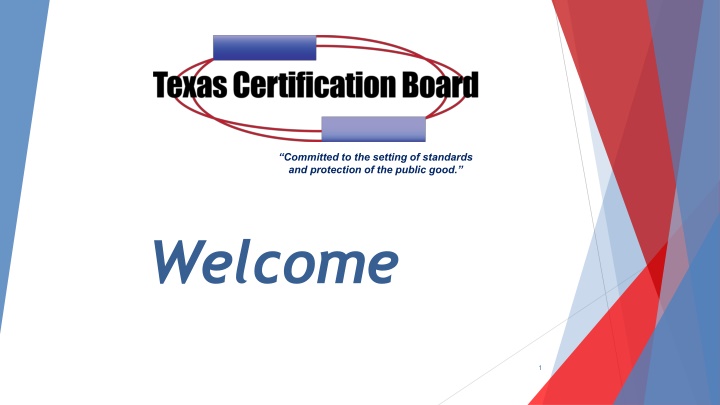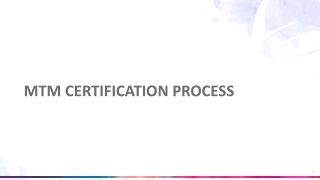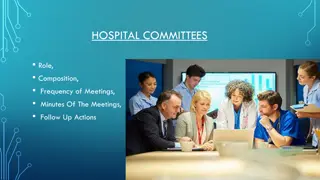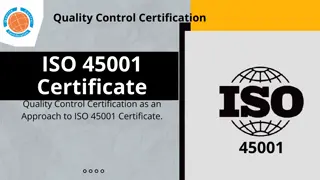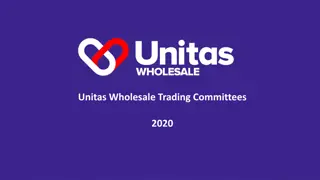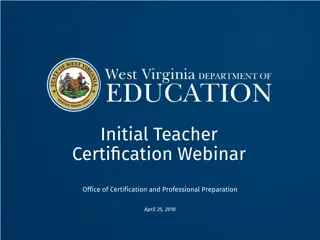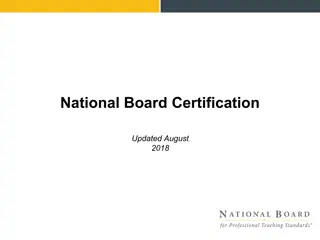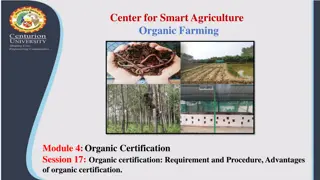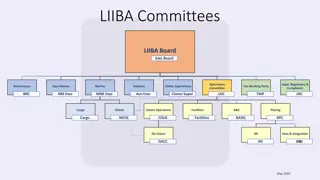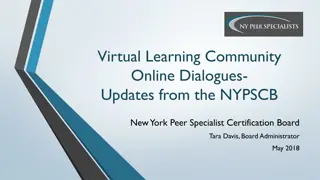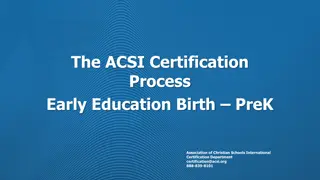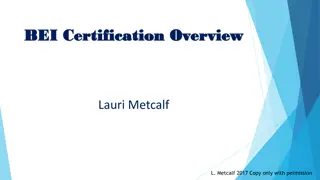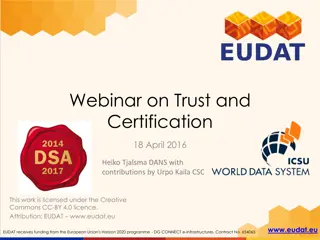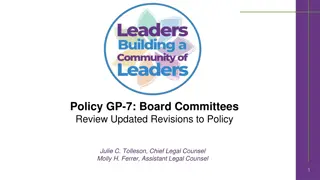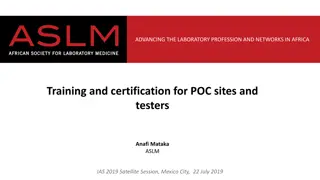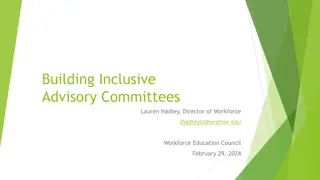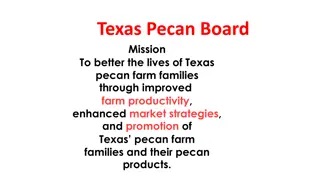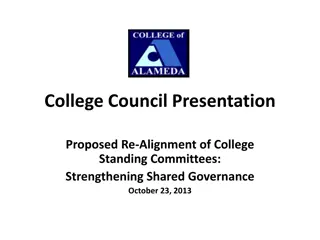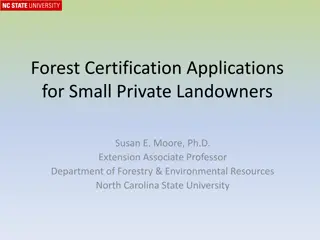Texas Certification Board Committees Overview
The Texas Certification Board oversees various committees including Standards, Ethics, Diversity & Inclusion, Prevention, Justice Involved, Peer Support, and Marketing. Each committee plays a crucial role in maintaining standards, ethics, and promoting diversity within the organization.
Download Presentation

Please find below an Image/Link to download the presentation.
The content on the website is provided AS IS for your information and personal use only. It may not be sold, licensed, or shared on other websites without obtaining consent from the author.If you encounter any issues during the download, it is possible that the publisher has removed the file from their server.
You are allowed to download the files provided on this website for personal or commercial use, subject to the condition that they are used lawfully. All files are the property of their respective owners.
The content on the website is provided AS IS for your information and personal use only. It may not be sold, licensed, or shared on other websites without obtaining consent from the author.
E N D
Presentation Transcript
Committed to the setting of standards and protection of the public good. Welcome 1
What is the Texas Certification Board ? 1. Certifies counselors above and beyond their license to provide counseling services 2. Administers licensure and certification examinations 3. Certifies providers of continuing education 4. Monitors and enforces counselor ethics 5. Works to promote counselor reciprocity 2
Who is on Texas Certification Board ? The Board is composed of nine elected volunteers who represent a diversity of prevention, treatment, and recovery services, functions, geographical areas, ethnicity and gender. Additional Allied Health Professionals also volunteer to serve on various committees. 3
TCB Committees 1. Standards 2. Ethics 3. Diversity, Equity & Inclusion 4. Prevention 5. Justice Involved 6. Peer Support 7. Marketing 4
Standards Committee The Standards Committee coordinates, reviews and makes recommendations regarding Credential, Continuing Education Provider and Peer Training Entity standards. 5
Ethics Committee The Ethics Committee receives all ethical complaints, notifies the credentialed individual or training entity about the complaint against them, conducts a closed door review and reports the final disposition to the Board and the individual or training entity. 6
Diversity, Equity & Inclusion Committee The Diversity, Equity and Inclusion Committee works with all committees to support Diversity, Equity and Inclusion protocols with all credentialed staff, support staff, services and individuals served. 7
Prevention Committee The Prevention Committee supports prevention programs and agencies in their efforts to provide evidence-based prevention strategies to meet personnel requirements and ensure competent prevention credentialed staff. 8
Justice Involved Committee The Justice Involved Committee assists in the efforts to support criminal justice agencies in their efforts to meet law requirements as it applies to credentialed staff and support services for the justice-involved population. 9
Peer Support Committee The Peer Support Committee assists Peer Specialist in their efforts to meet Texas Administration Codes and TCB requirements. 10
Marketing Committee The Marketing Committee works to promote all the certifications offered. 11
What is Certification? Certification is a process by which a non-governmental organization grants recognition to an individual who has met predetermined qualifications and has demonstrated a level of knowledge and skill required in a profession specified by that organization. Certification is typically a voluntary process. 12
Certification Represents the achievement of a level of professional competency agreed by the international community as qualified to practice effectively. Can help a professional obtain a license in some states. Can also allow a professional to more easily relocate to another state, territory or jurisdiction. 13 https://internationalcredentialing.org/lic-cert November 2022
What is Licensure? Licensure is a governmental grant of legal authority to practice a profession within a particular scope of practice. Under a licensure system, a government will define by statute the tasks and function or scope of practice of a profession and these tasks may be legally performed only by those holding that license. It is required in order to practice or to call oneself a licensed professional. 14 https://internationalcredentialing.org/lic-cert November 2022
Examples of Licensure in Texas Programs Licensed by TDLR Cosmetologists Auctioneers Barbers Electricians Massage Therapy Midwives Tow truck operators Programs Licensed by Tx BHEC Licensed Professional Counselors Marriage and Family Therapists Social Workers Programs Licensed by TxHHSC Chemical Dependency Counselors Chemical Dependency Treatment Facilities 15
Why get certified? Ability to transfer certification to other states and jurisdictions. International recognition of a competency based certification. Recognition of a specific area of practice and higher level of education. 16
The Value of Credentialing 1. Ensuring the publics safety. 2. Enhancing Public Funds Accountability 3. Providing Practitioner Benefits Quality care requires a competent workforce that is well trained, educated, and skilled in providing appropriate services. 17 https://internationalcredentialing.org/valuecred November 2022
Committed to the setting of standards and protection of the public good. IC&RC International Certification and Reciprocity Consortium 18
IC&RC- INTERNATIONAL CERTIFICATION & RECIPROCITY CONSORTIUM IC&RC is an international non-profit organization that promotes public protection by developing internationally recognized credentials and examinations for prevention, substance use disorder treatment, and recovery professionals. 19 https://internationalcredentialing.org/page-1738918 November 2022
IC&RC- INTERNATIONAL CERTIFICATION & RECIPROCITY CONSORTIUM IC&RC develops examinations, sets minimum credentialing standards, and facilitates reciprocity for certified professionals for the following credentials: 1. ALCOHOL & DRUG COUNSELOR (ADC) 2. ADVANCED ALCOHOL & DRUG COUNSELOR (AADC) 3. CLINICAL SUPERVISOR (CS) 4. PREVENTION SPECIALIST (PS) 5. CERTIFIED CRIMINAL JUSTICE ADDICTIONS PROFESSIONAL (CCJP) 6. PEER RECOVERY (PR) 20 https://internationalcredentialing.org/page-1738918 November 2022
Committed to the setting of standards and protection of the public good. Current Texas Certifications 21 https://www.tcbap.org/page/certification November 2022
Current Texas Certifications Advanced Alcohol and Drug Counselor (AADC) * Certified Criminal Justice Addictions Professional Applicant Status (CCJP-A) Alcohol and Other Drug Abuse Counselor (ADC) * Certified Criminal Justice Addictions Professionals (CCJP) * Peer Recovery Support Specialist (PRSS) * Advanced Certified Prevention Specialist (ACPS)* Re-Entry Peer Specialist (JI-RPS) Mental Health Peer Specialist (MHPS) Certified Prevention Specialist (CPS)* Recovery Support Peer Specialist (RSPS) Associate Prevention Specialist (APS) Peer Specialist Supervisor (PSS) Certified Clinical Supervisor (CCS) * Clinical Supervisor Designation (CSD) 22 * Indicates reciprocity with IC&RC
Alcohol and Drug Counselor Advanced Alcohol and Drug Counselor (AADC) * The AADC credential will separate those counselors who are content with a status quo existence from those who continue to achieve a higher level of excellence within the addiction profession. 23 * Indicates reciprocity with IC&RC
Alcohol and Drug Counselor Alcohol and Other Drug Abuse Counselor (ADC) * The primary purpose of the credential is to raise the standards of education and experience levels so that individual counselors with exceptional experience or education can be duly recognized by their peers and professional organizations, statewide and nationally. 24 * Indicates reciprocity with IC&RC
Prevention Specialist Certified Prevention Specialist (CPS) * The CPS shall be viewed as a fully qualified specialist in the area of prevention and able to provide these services independently or with minimal supervision, to the degree allowed by applicable laws, statutes and regulations. 25 * Indicates reciprocity with IC&RC
Prevention Specialist Advanced Certified Prevention Specialist (ACPS) * The ACPS is a TCB credential to recognize prevention specialists who have completed additional degree work. The ACPS shall be viewed as a fully qualified specialist in the area of prevention and able to provide these services independently or with minimal supervision, to the degree allowed by applicable laws, statutes and regulations. 26 * Indicates reciprocity with IC&RC
Prevention Specialist Associate Prevention Specialist (APS) The APS designation is intended for individuals pursuing competency in the field of substance use prevention or those with sustained employment in the field. 27
Criminal Justice Certified Criminal Justice Addictions Professional Applicant Status (CCJP-A) A CCJP-A status may be issued to an individual who has met the educational and practicum requirements for the Texas CCJP, but has not yet passed the exam and may still be working on direct service/work experience hours. 28
Criminal Justice Certified Criminal Justice Addictions Professionals (CCJP) * This credential was designed in close collaboration with TCB and Criminal Justice Professionals to meet their specific and unique needs. 29 * Indicates reciprocity with IC&RC
Clinical Supervisor Certified Clinical Supervisor (CCS) * The CCS credential upgrades and standardizes qualifications of those working in the field of supervision. In a treatment setting, the CCS shall improve the quality of supervision of interns, enhance the credibility of the practicum experience and provide greater relevance for certification. 30 * Indicates reciprocity with IC&RC
Clinical Supervisor Clinical Supervisor Designation (CSD) The Clinical Supervisor Designation credential upgrades and standardizes qualifications of those working in the field of supervision. In a treatment setting, the CSD shall improve the quality of supervision of interns, enhance the credibility of the practicum experience and provide greater relevance for certification. 31 * Indicates reciprocity with IC&RC
Peer Support Peer Recovery Support Specialist (PRSS) * The PRSS credential standardizes qualifications of those working in peer recovery support within the field chemical dependency, mental health, and/or co- occurring disorders. The credential demonstrates a higher level of competency through the passing of an IC&RC exam. * Indicates reciprocity with IC&RC 32
Peer Support Re-Entry Peer Specialist (JI-RPS) Re-Entry Peer Specialists support participants with a mental health and/or substance use challenge that have been incarcerated (jail or prison) toward long-term recovery. 33 * Indicates reciprocity with IC&RC
Peer Support Mental Health Peer Specialist (MHPS) The MHPS credential standardizes qualifications of those working in Recovery Support within the field of mental health, and/or co-occurring disorders. This certification is intended for providing peer specialist services through Medicaid and applies only to peer specialist services that are Medicaid reimbursable. 34
Peer Support Recovery Support Peer Specialist (RSPS) The RSPS credential standardizes qualifications of those working in Recovery Support Peer within the field of chemical dependency, mental health, and/or co-occurring disorders. This certification is intended for providing peer specialist services through Medicaid and applies only to peer specialist services that are Medicaid reimbursable. 35
Peer Support Peer Specialist Supervisor (PSS) The PSS credential standardizes qualifications of those working in Recovery Support Peer within the field of chemical dependency, mental health, and/or co-occurring disorders. This certification is intended for providing peer specialist services through Medicaid and applies only to peer specialist services that are Medicaid reimbursable. 36
Peer Services Training The Training Entity The Training Entity credential standardizes qualifications of those working in Peer Services Training within the field of substance use, mental health, and/or co-occurring disorders. Instructor The instructor credential standardizes qualifications of those working in Peer Services Training within the field of substance use, mental health, and/or co-occurring disorders. 37
Which Certification is Right For You ? Advanced Alcohol and Drug Counselor (AADC) * Certified Criminal Justice Addictions Professional Applicant Status (CCJP-A) Alcohol and Other Drug Abuse Counselor (ADC) * Certified Criminal Justice Addictions Professionals (CCJP) * Peer Recovery Support Specialist (PRSS) * Advanced Certified Prevention Specialist (ACPS)* Re-Entry Peer Specialist (JI-RPS) Mental Health Peer Specialist (MHPS) Certified Prevention Specialist (CPS)* Recovery Support Peer Specialist (RSPS) Associate Prevention Specialist (APS) Peer Specialist Supervisor (PSS) Certified Clinical Supervisor (CCS) * Clinical Supervisor Designation (CSD) 38 * Indicates reciprocity with IC&RC
Committed to the setting of standards and protection of the public good. All Texas Certification applications and information can be found at tcbap.org 39
